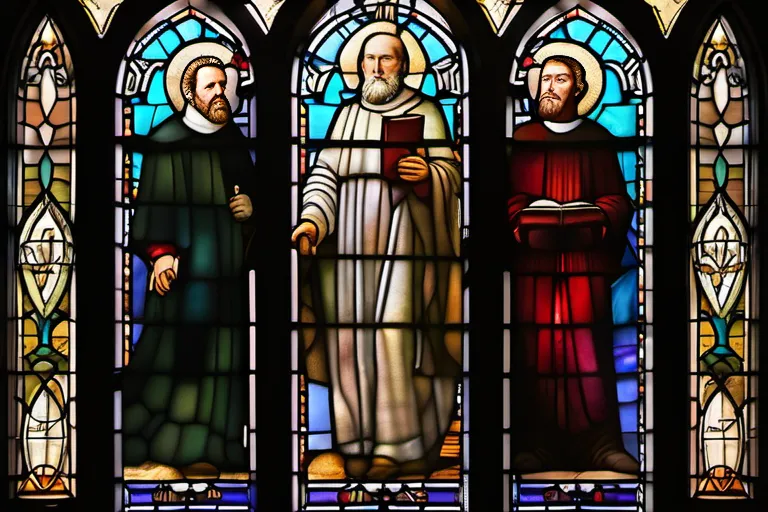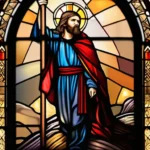Explore the foundations, beliefs, and history of Reformed Theology in this detailed article.
Reformed Theology is a branch of Christianity that emphasizes God’s sovereignty and human depravity. In this article, we will delve into its origins, key doctrines, and impact on the Christian faith.
The Origins of Reformed Theology
The origins of Reformed Theology are deeply intertwined with the fabric of the Protestant Reformation, a pivotal moment that shook the Christian world in the 16th century. Imagine you’re standing at the threshold of a grand cathedral, where centuries-old traditions held sway. Suddenly, Voilà!, enters Martin Luther with his 95 theses, questioning the practices and calling into account the very foundations of what was believed. This event marked the beginning of a seismic shift in Christian thought.
The Reformation didn’t just spring from nowhere; it was a reaction to perceived abuses within the Catholic Church, much like a river carving through rock over time. As Martin Luther began his critique, other reformers such as John Calvin emerged, bringing their own insights and interpretations. The Reformed tradition, which came to be known for its emphasis on scripture, sovereignty of God, and predestination, began to take shape.
Journey with me back in time to the Swiss city of Geneva where John Calvin worked tirelessly to establish a new theological framework. His Institutes of the Christian Religion became a cornerstone document, laying out the principles that would define Reformed Theology. Think of it as a blueprint for a new church—solid, yet adaptable to the changing landscape.
The Reformed tradition didn’t just develop in isolation; it engaged with other reformers and thinkers. The interactions were like a dance, where each step and counter-step added layers of complexity and depth to the theology. By the time we reach the 17th century, figures like Jacobus Arminius introduced new ideas that would later lead to the formation of Arminianism, creating a rich tapestry of Reformed thought.
From its origins in protest against corruption to its detailed theological development, Reformed Theology has always been about more than just rebelling—it’s about reimagining the relationship between God and humanity. As we move forward into exploring the key doctrines that define this tradition, it’s important to remember that these roots run deep, shaping not only theology but also practical aspects of church life and society.
Key Doctrines of Reformed Theology
Now that we’ve explored the origins of Reformed Theology, let’s delve into its core doctrines and beliefs. One of the defining features of Reformed Theology is its emphasis on the five solas: sola scriptura, sola fide, sola gratia, solus Christus, and soli Deo gloria. These Latin phrases translate to ‘by scripture alone,’ ‘by faith alone,’ ‘by grace alone,’ ‘through Christ alone,’ and ‘to God be the glory,’ respectively.
When we talk about sola scriptura, we’re essentially saying that the Bible is the ultimate authority in all matters of faith and practice. It’s as if every question we have, from the nature of salvation to the meaning of our lives, finds its answer within these sacred pages. But how do we ensure that our understanding aligns with the true meaning of scripture? This leads us to sola fide, or ‘by faith alone,’ which asserts that salvation is granted by God’s grace through faith in Jesus Christ.
Imagine you’re lost in a dense forest, and all around you are signs pointing the way. The Bible serves as your guide, but you can’t see beyond the trees to understand it fully without relying on sola gratia, or ‘by grace alone.’ This doctrine teaches us that our salvation is entirely through God’s mercy and goodness, not because of anything we’ve done.
At the heart of Reformed Theology lies the belief in solus Christus, or ‘through Christ alone.’ It’s as if Christ is a lighthouse in a stormy sea, guiding us to safety. Without Him, none can find their way home to eternal life.
Finding our journey through this faith can sometimes feel like a solitary path, but remember, we walk it with the soli Deo gloria in mind. This phrase means ‘to God be the glory,’ reminding us that everything we do should point back to Him and His greatness.
These five solas form the backbone of Reformed Theology, shaping its understanding of God’s sovereignty, human depravity, and the necessity of divine grace. They are not just words but a living reality that transforms lives and communities. By embracing these doctrines, believers find their identity in Christ and see the world through His lens.
The History of Reformed Theology
The History of Reformed Theology: Follow the Evolution
Imagine tracing the roots of a sturdy tree that has grown deep into the heart of Christianity, its branches spreading wide over centuries and across continents. Reformed Theology is such a tree, with key figures like John Calvin, Martin Luther, and Jonathan Edwards acting as pivotal leaves guiding its growth.
John Calvin, a 16th-century French theologian, stands at the core of this theological lineage. His Institutes of the Christian Religion (1536) laid the groundwork for much of Reformed Theology as we know it today. In many ways, Calvin can be seen as a modern-day architect, rebuilding the foundations of church doctrine after the tumultuous period of the Protestant Reformation. His emphasis on predestination and justification by faith alone resonates even in our contemporary discussions.
But how did this all start? Martin Luther’s nailing of his Ninety-Five Theses in 1517 sparked a revolution, challenging not just the practices but also the very doctrines of the Roman Catholic Church. Though Luther was the catalyst, it was Calvin who took his ideas further, refining and expanding them into a cohesive theological system that continues to influence Christian thought.
Jonathan Edwards, an 18th-century American theologian, built upon these foundations. His sermons on grace and sin resonated deeply in the Puritan community he served. In his work Freedom of Will (1754), Edwards delves into the depths of human nature and God’s sovereignty, a topic that remains central to Reformed Theology. Like Calvin before him, Edwards’ writings offer profound insights into the nature of God’s grace and man’s fallen state.
The journey from Luther’s reformative sparks to Calvin’s systematic theology and then to Edwards’ detailed expositions is akin to watching a single flame grow into a wildfire, spreading light and heat far beyond its original source. This evolution not only enriches our understanding but also underscores the dynamic nature of theological thought across centuries.
Reformed Theology in Practice
How do you reconcile your faith with everyday life? For those within the Reformed community, Reformed Theology offers guidance not just in doctrine but also in worship and daily practice. Let’s explore how these principles manifest in their lives.
In worship, the Reformed tradition emphasizes a simplicity that focuses on the centrality of God. Think of it like choosing a single bright light amidst a dark room, drawing attention to the divine message. The liturgy is structured, yet prayer and hymns are used to deepen one’s relationship with God. Reformed worship often includes responsive reading and singing, where the congregation actively participates in the service. This communal act of worship not only glorifies God but also binds the community together.
When it comes to ethics, Reformed Theology is deeply concerned with living a life that honors God. It’s about more than just following rules; it’s about transforming one’s heart and actions. For example, consider the commandment to love thy neighbor as thyself. In practical terms, this means not only helping those in need but also seeking justice in society. The Reformed community often engages in social activism, whether through local outreach programs or broader efforts like advocating for environmental stewardship. This approach sees ethical living as an integral part of Christian discipleship.
In daily life, the principles of Reformed Theology are lived out in various ways. For instance, the concept of sola scriptura (Scripture alone) means that all aspects of faith and practice must be grounded in the Bible. This isn’t just about reading it but applying its teachings to every facet of one’s life. From managing finances responsibly to practicing humility and integrity at work, the Reformed believer seeks to reflect God’s character in their actions.
Imagine a garden where each plant represents an aspect of Christian living—worship as the centerpiece, ethics as the backbone, and daily practice as the nurturing soil that sustains it all. Just like these elements are interconnected, so too are the practices of Reformed Theology woven into the fabric of their faith.
The Impact of Reformed Theology
The Impact of Reformed Theology: Investigate the influence of Reformed Theology on Christianity as a whole, from denominations to theological education.
How has Reformed Theology shaped the landscape of Christianity? Just like a river carving its path through rugged terrain, this theology has profoundly influenced various Christian denominations and institutions. Consider the Westminster Confession of Faith; it’s not just a document but a blueprint that guides numerous churches in their beliefs and practices.
One cannot discuss Reformed Theology without acknowledging its impact on theological education. Seminaries across the globe have embraced this framework, shaping the minds of future pastors and theologians. Think about it: these institutions are like fertile soil where young thinkers cultivate a deep understanding of God’s Word through the lens of Reformed thought.
The influence extends to practical matters too. From church governance to ethical standards, Reformed principles permeate the fabric of many Christian communities. It’s as if the theology acts like a thread that weaves together different aspects of Christian living, creating a cohesive tapestry that guides believers in their walk with God.
Moreover, the spread of Reformed Theology across continents and cultures has led to vibrant churches and movements that reflect its core tenets. Whether it’s through church planting or community outreach, these churches embody the essence of this theology, making disciples and impacting societies around the world.
In conclusion, Reformed Theology’s influence is both profound and pervasive, reshaping not only individual beliefs but entire denominational structures and educational institutions. It continues to be a vital force in shaping Christian thought and practice today, prompting us to ask: How will this theology continue to evolve in our rapidly changing world?
Reformed Theology Today
Reformed Theology today stands as a vibrant and dynamic force, resonating deeply within contemporary Christian communities. It has evolved from its original 16th-century roots into a rich tapestry of beliefs and practices that continue to shape faith and morality in our complex world. How does this ancient theology speak to us now? Isn’t it just a relic of the past, or is there something profound about Reformed Theology that still captures the imagination of people today?
One key aspect of Reformed Theology today lies in its continued emphasis on the sovereignty of God and the grace of Christ. In an era where human autonomy often takes center stage, the idea that our salvation comes solely through faith in Jesus Christ can be a radical concept. How does this belief challenge our modern understanding of freedom and individual choice? Can we still find relevance in the doctrine of total depravity, which suggests that without God’s grace, humans are incapable of doing good?
Reformed Theology today also manifests in various contemporary expressions, from influential evangelical movements to academic theological discourse. Consider the work of theologians like John Piper or Timothy Keller; their books and sermons often draw directly from Reformed principles but apply them to contemporary issues such as social justice and personal holiness. Do these modern interpreters truly capture the essence of Reformed Theology, or do they veer too far into new territory?
The impact of Reformed Theology is not confined to church walls; it reaches into communities and cultures worldwide. For instance, the focus on community service and charitable work in Reformed churches can be seen as a practical expression of their beliefs. But how does this activism align with the broader mission of spreading the Gospel? And what about the controversial aspects of some Reformed teachings, such as predestination or the limited atonement—do these concepts still hold water in today’s pluralistic society?
Reformed Theology today faces both challenges and opportunities. It must navigate the tensions between tradition and innovation while remaining faithful to its core doctrines. In a world that often emphasizes individualism, how does Reformed theology offer a balanced perspective on human nature and divine grace? Ultimately, this theology invites us to consider our place in God’s redemptive plan—a plan that is both vast and personal.
Conclusion
 By understanding Reformed Theology, you will gain a deeper appreciation for its role in shaping Christianity and its enduring relevance today.
By understanding Reformed Theology, you will gain a deeper appreciation for its role in shaping Christianity and its enduring relevance today.











